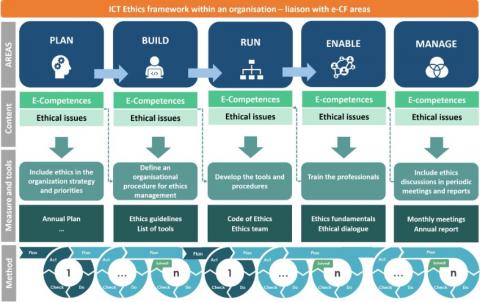Pervasive technologies such as Artifcial Intelligence, Virtual Reality and the Internet of Things, despite their great potential for improved workability and well-being of older workers, entail wide ethical concerns, with opaque ethical boundaries that can not be covered by existing legislation. The significance of initiating a trustworthy framework of data processing applicable to pervasive technology systems is therefore undeniable and, especially for older workers, defining ethical determinants is pivotal towards building trust and reinforcing better workability.
In Ageing@Work, taking into account the complexity of workplace environments, the relevance of this complexity with the potential of technology pervasiveness and current unexpected societal crisis such as COVID-19 and its reflections to human resource management, the need for develop specific mechanisms that will ensure the privacy of the monitored seniors at work and homeplace emerged. To this end, a specific ethics framework, termed SmartFrameWork has been developed to analyse ethical implications related to integrated platforms of advanced, personalized and adaptive ICT tools, which aim to improve the wellbeing and productivity on the basis of AI, AR/VR, and IoT wearable devices, and tailor the workplace to the evolving needs and specificities of the ageing workers. SmartFrameWorK is built upon a five-dimensional approach of ethics norms: autonomy, privacy, transparency, trustworthiness and accountability to incite trust in digital workplace technologies. In accordance with this five-step design, an initial analysis of topics concerning ethics and data protection in relation to each professional case and its particular ethical aspects has been conducted. Crucial activities have been established in terms of data management such as cultivating and implementing an ethical culture with ethical experts and Ethical Boards’ consultation and support, defining and applying ethical values in the daily research practice to ensure the appropriateness of decisions taken for data management of older adults’ workers. In addition to workers’ satisfaction, ethics have been approached in liaison with system specification and architecture, ethics by design and data management upon human/ workers’ rights’ preservation. Privacy and confidentiality in the workplace were among the critical concerns for both employers and employees. Therefore, in the light of smart working environments. through ICT technologies’ use, a typology has been specified according to a number of categorical variables, including (a) data type, (b) context of data, (c) specific technologies and, (d) actors involved in the collection and processing of this data. a clear definition of each security and ethical concern in accordance with the proper mitigation measures have been outlined. A thorough mapping of all data along with the technologies involved was valuable in understanding the potential risks of data use and the limitations that had to be defined according to social sensitive groups as older adults and the access to their data. These specific parameters according to workers’ datasets use that may implicate ethical concerns are quoted below:
• Involvement of technologies and techniques that measure human body dimensions;
• Verification of reliability and validity of anthropometric data measurement;
• Sensory problems processing that might be associated with the impact in workability;
• Lifestyle habits’ monitoring as part of public health monitoring;
• Monitoring and measuring occupational health data;
• Measuring occupational health and safety risks.
Data-related risks have been considered in accordance with each phase of the data cycle from the collection, processing, storage, to the analysis and use of data in terms of risks assessment and decision-making. , etc.). Design principles and guidelines such as respect to privacy rules had to be followed by the designers and developers in order to ensure balance between personalization and privacy.
These results are in alignment with European initiatives such as the work of EU Professional Ethics Framework for the ICT profession (EU ICT Ethics), to whom our AGEING@WORK Responsible Research and Ethics expert Dr. Sofia Segkouli participates as a Team Expert. The objective of EU ICT Ethics is the publication of a CEN Technical Specification (CEN/TS) “European Professional Ethics Framework for the ICT Profession (EU ICT Ethics)” including a methodology and application guide
Smart Workplaces for older adults: coping ‘ethically’ with technology pervasiveness- AGEING@WORK and the EU ICT Ethics
Mar
09
2022
By ageingatworkmanager

